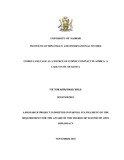| dc.description.abstract | Conflicts world over have been majorly brought about by political rivalry, competition over resources and, religious differences, among others. Today, conflicts, especially those with ethnic dimensions continue to be the most common form of armed conflict around the world and in Africa in particularly. In the recent past for instance, there have been various occurrences of ethnic related clashes including in Kenya, South Sudan, Kurdish battle for self-governance in Iraq, Iran and Turkey, guerilla wars in El Salvador and Nicaragua and the 1994 Rwandan genocide between the Hutus and Tutsis, just to cite few examples.
This research looks at the role of coded language in ethnic conflicts. Coded language are words, phrases and terms used by a group of people to make reference to an object, person or groups of people that can only be understood by the said group. The study will investigate the contribution of coded language in aggravating ethnic conflicts by taking a case study of Kenya. The study will use Coded Language and Internally Recurrent Electoral Violence datasets to assess the role of linguistic diversity in determining the likelihood of ethnic conflicts. The study will perform a series of multivariate examinations so as to assess whether or not these variables have a huge effect in increasing or reducing the probability of occurrence of ethnic clash.
The objective of the study is to identify the coded languages used among the Kenyan ethnic communities and investigate the relationship between use of coded language and ethnic conflict
The specific objectives are to establish the genesis of the use coded language among the Kenyan ethnic communities and investigate the effects it has had on national integration in Kenya.
During the study, it was established that almost every ethnic community in Kenya has a coded language or phrase that uses to refer to another community, most of which have a negative connotation.
x
It was established that long-term and consistent usage of coded language has created an attitude towards the person or object in reference.
The media was also found to be a major contributor of promotion of ethnic violence as they provide a platform for broadcasting and publication of use of coded and unsavoury language among the political class.
This study makes recommendations to relevant institutions in government and the Media Council of Kenya. Key among the recommendations is to the government of Kenya to focus more on the implementation of policies formulation of strict laws on use of coded language and media policies governing broadcasting and publication of such. | en_US |

